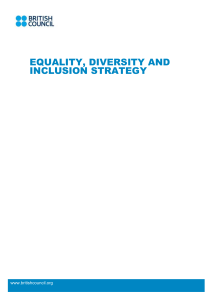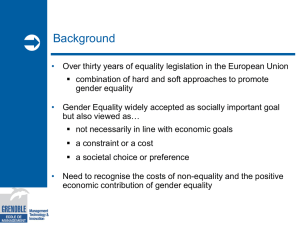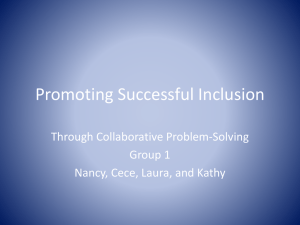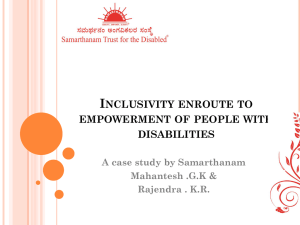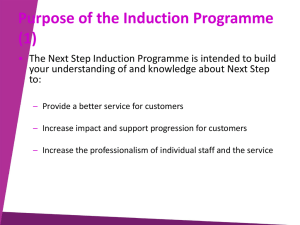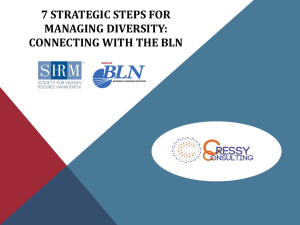Refresh of Manager Induction Standards Area Officer Skills for Care
advertisement
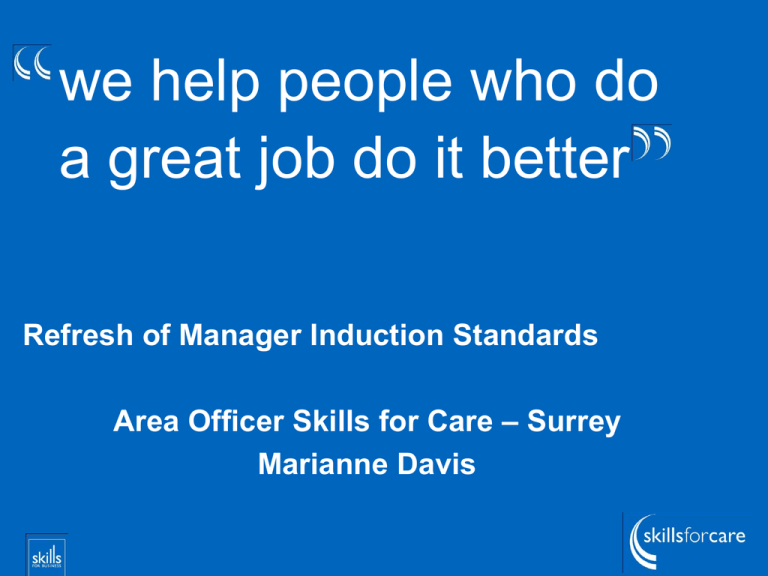
we help people who do a great job do it better Refresh of Manager Induction Standards Area Officer Skills for Care – Surrey Marianne Davis Manager Induction Standards - History • • • • Launched 2008 6 standards Not mandatory Mapped to Leadership and Management National Occupational Standards • Aimed at new and emerging managers • Suggested completion within 6 months Manager Induction Standards - old standards themes 1.Social care principles and values 2. Leadership and facilitating change 3. Working with people 4. Using resources 5. Achieving outcomes 6. Managing self and personal skills Manager Induction Standards - why did we refresh the standards? • • • • • • Qualifications and Credit Framework New leadership diploma Personalisation Changes in service delivery Person centred practice – even more central Needed to support the needs of a new workforce and new ways of working Manager Induction Standards – ‘core’ standards. 1. 2. 3. 4. 5. 6. 7. 8. Governance and accountability Systems / processes in communication Partnerships working / relationships Leading person centred practice Team leadership Managing resources Equality, diversity and inclusion Safeguarding and protection Manager Induction Standards ‘additional’ standards 9. Personal development 10. Change and growth 11. Managing business 12. Ensuring quality Standard 3 Partnership Working and Relationships Introduction It is important that all social care organisations recognise the benefits of working with partners to enhance the support they offer . There will be existing partners with whom to maintain relationships but you may also identify new key partners that you will wish to engage. Care homes are communities in their own right. However they are also part of a wider community and it is widely acknowledged that good links with that wider community can enhance the quality of life for those who are supported. Main area Knowledge requirement 3.1.1 Know the range of individuals, organisations and communities that can support your work. 3.1. Understand the context of partnership working 3.2 Understanding the importance of managing relationships 3.1.2 Define the benefits of networking in building effective partnerships and relationships, including local communities for your organisation / work setting. 3.1.3 Identify the features of effective partnership working to deliver better outcomes for people you support 3.1.4. Understand own role in managing external relationships in the context of partnership 3.2.1 Explain own role and responsibilities in managing internal relationships 3.2.2 Understand your role in managing challenges within relationships Standard 7 Equality, Diversity and Inclusion Introduction Standard 4 of the Common Induction Standards recognises the value and importance of equality and inclusion including legislation about equality and diversity and how to provide support that includes everyone and respects their belief Main area 7.1. Understand diversity, equality and inclusion in own area of responsibility 7.2. Be able to champion diversity, equality and inclusion Knowledge requirement 7.1.1 Explain models of practice that underpin equality, diversity and inclusion in own area of responsibility 7.1.2 Analyse the potential effects of barriers to equality and inclusion in own area of responsibility 7.1.3 Analyse the impact of legislation and policy initiatives on the promotion of equality, diversity and inclusion in own area of responsibility 7.2.1 Understand your own role in providing others with information about: the effects of discrimination the impact of inclusion the value of diversity 7.2.2 Understand your role in supporting others to challenge discrimination and exclusion Standard 8 Safeguarding and Protection Introduction This Standard develops a deeper understanding of your own responsibility to lead and manage others to safeguard individuals who you support. In this standard you will need to demonstrate your knowledge of how to manage and develop a whole service that promotes risk awareness and effective risk management rather than one that is risk averse. Main area Knowledge requirement 8.1.1 Understand your role in providing information to others on: indicators of abuse measures that can be taken to avoid abuse taking place steps that need to be taken in the case of suspected or 8.1. Understand your role in promoting the alleged abuse protection of vulnerable adults 8.1.2 Understand the importance of the balance between respecting confidentiality and ensuring protection and wellbeing 8.1.3 Promote service provision that supports vulnerable adults to assess risks and make informed choices 8.2. Understand own responsibility to respond to 8.2.1.Explain why everyone has a responsibility to act on suspected or alleged abuse of children and concerns about the abuse of a child or young person young people whilst working with adults 8.2.2 Explain the actions to take if : there are concerns that a child or young person is being abused a child or young person alleges that they are being abused Manager Induction Standards - resources to support Freely available on website • Refreshed standards freely available on website • New short guide for direct employers Current priced publications to be replaced • Guide for new managers • Guide for new manager’s managers Available March 2012 Manager Induction Standards - resources to support • • • • • • • Summary Log Assessment evidence recording Reflective learning log Organisation training plan Personal development plan Action plan for personal development Supervision and appraisal structure Contact details Marianne Davis Email: Marianne.davis@skillsforcare.org.uk Direct Line: 01189 662537 Mobile: 07770 352 039
